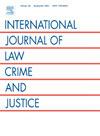Lessons for women's reintegration programs based on an evaluation of a program in Chile
IF 1.4
4区 社会学
Q3 CRIMINOLOGY & PENOLOGY
International Journal of Law Crime and Justice
Pub Date : 2025-05-26
DOI:10.1016/j.ijlcj.2025.100751
引用次数: 0
Abstract
This article, presented within the framework of the 68th session of the United Nations Commission on the Status of Women (CSW68), analyzes the evaluation of a reintegration program for incarcerated women in Chile to identify key factors that contribute to reducing recidivism and promoting social reintegration. Through a gender-responsive lens, the study examines the implementation and challenges of such programs in the Chilean prison context, highlighting how principles of gender-sensitive intervention are applied in practice. The research contributes to the broader academic discourse on women's reintegration and desistance processes in Latin America and beyond. Findings underscore the need for comprehensive, gender-responsive policies and programs that address the structural and social barriers faced by women during incarceration and post-release. The article concludes with policy recommendations aimed at enhancing the effectiveness of gender-responsive interventions, emphasizing their critical role in reducing marginalization and fostering long-term inclusion of women in prison.
基于对智利一个方案评估的妇女重返社会方案的经验教训
本文是在第68届联合国妇女地位委员会(CSW68)框架内提出的,分析了对智利被监禁妇女重返社会方案的评估,以确定有助于减少累犯和促进社会重新融入的关键因素。通过对性别问题敏感的视角,本研究考察了此类项目在智利监狱环境中的实施情况和面临的挑战,强调了对性别问题敏感的干预原则如何在实践中得到应用。这项研究有助于对拉丁美洲和其他地区妇女重返社会和抵抗进程进行更广泛的学术讨论。调查结果强调,需要制定全面的、促进性别平等的政策和方案,解决妇女在监禁期间和释放后面临的结构性和社会障碍。文章最后提出了政策建议,旨在提高促进性别平等的干预措施的有效性,强调这些措施在减少边缘化和促进妇女长期入狱方面的关键作用。
本文章由计算机程序翻译,如有差异,请以英文原文为准。
求助全文
约1分钟内获得全文
求助全文
来源期刊
CiteScore
2.70
自引率
0.00%
发文量
25
审稿时长
47 days
期刊介绍:
The International Journal of Law, Crime and Justice is an international and fully peer reviewed journal which welcomes high quality, theoretically informed papers on a wide range of fields linked to criminological research and analysis. It invites submissions relating to: Studies of crime and interpretations of forms and dimensions of criminality; Analyses of criminological debates and contested theoretical frameworks of criminological analysis; Research and analysis of criminal justice and penal policy and practices; Research and analysis of policing policies and policing forms and practices. We particularly welcome submissions relating to more recent and emerging areas of criminological enquiry including cyber-enabled crime, fraud-related crime, terrorism and hate crime.

 求助内容:
求助内容: 应助结果提醒方式:
应助结果提醒方式:


